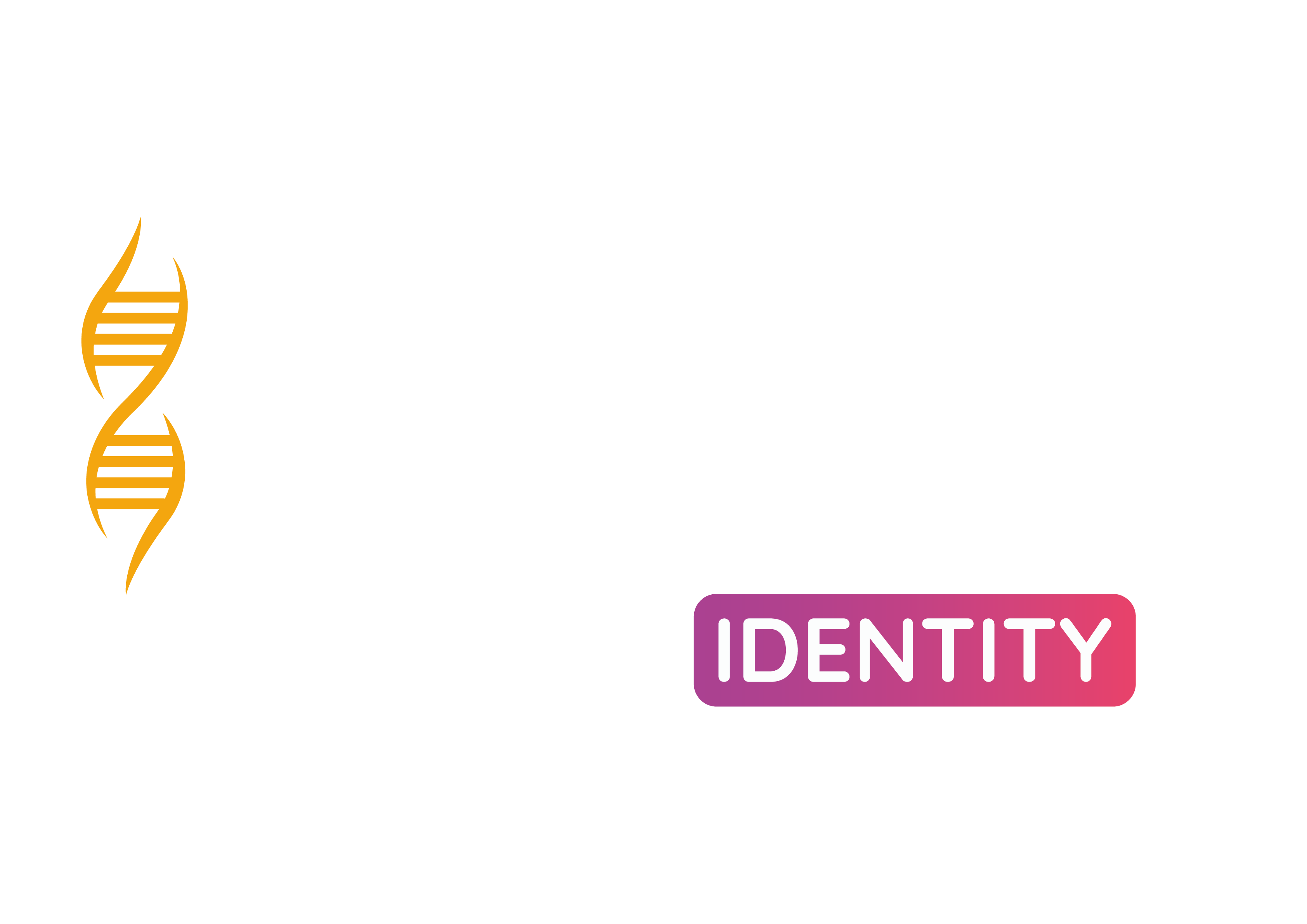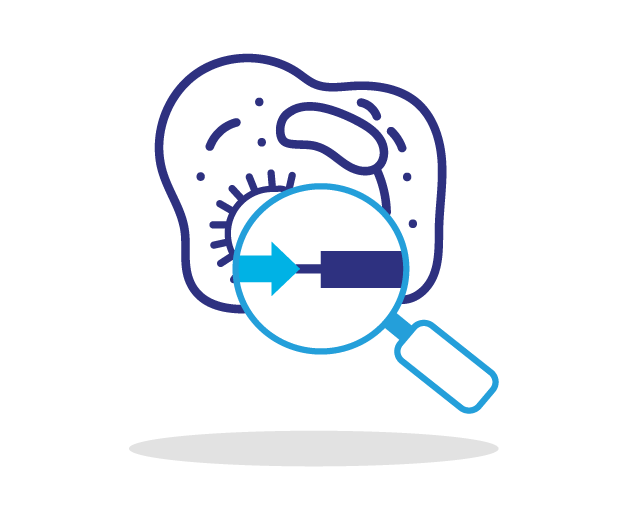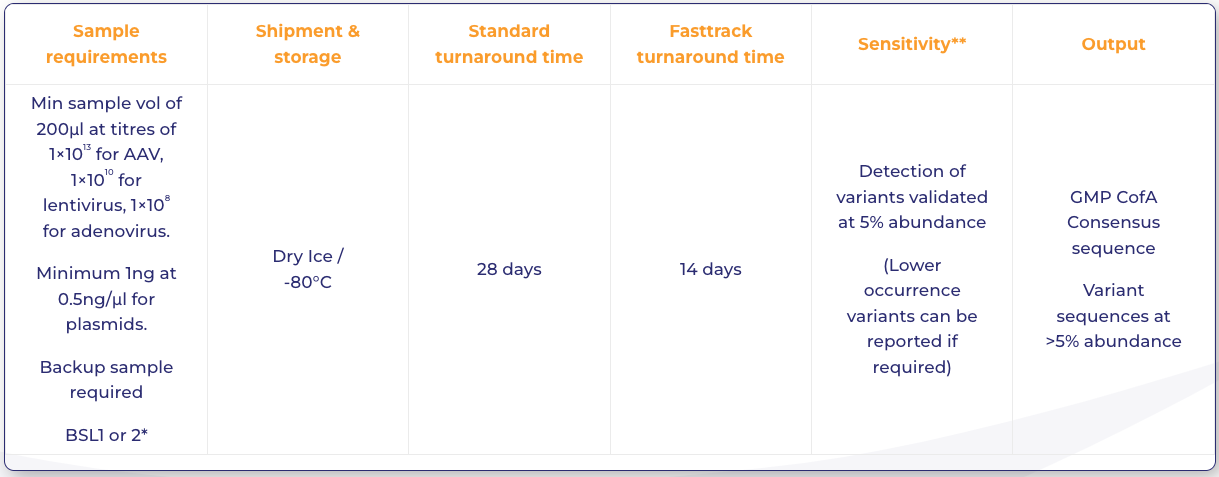Identity Confirmation
Genetic characterization of viral and plasmid products for release.

What is Identity confirmation and why is it important?
Identity testing is a critical component to release vector products, including viral and non-viral cell and gene therapies, as well as vaccine and oncolytic applications. Determination of the nucleic acid sequence of the vector and gene of interest is a regulatory requirement, with full nucleic acid sequence provision for vectors under 40kb. Therefore, direct sequencing is a standard and well-accepted approach.
Sanger sequencing has traditionally been employed for nucleic acid testing and is well accepted by regulators. However, an NGS approach provides several advantages over Sanger sequencing:
- Identify ultra-rare genetic variants <<5% (~20% variant detection limit for Sanger).
- More cost and time efficient over a sequential Sanger sequencing.
- Full coverage can be challenging with Sanger sequencing
As there is a regulatory expectation for appropriate characterization of critical raw materials, an aligned nucleic acid analysis strategy should also be employed for any plasmid input materials. This mitigates the risk that non-clonal variation within the manufacturing plasmids will affect the quality of the final product.
NGS screening offers several advantages, including the ability to detect ultra-rare genetic variants and providing more comprehensive coverage than traditional methods. This makes NGS a superior choice for nucleic acid testing in the context of ensuring the integrity and quality of vector products, plasmids, and other critical raw materials. By leveraging the advantages of NGS over Sanger sequencing, manufacturers can ensure a higher standard of nucleic acid analysis, ultimately contributing to the reliability and efficacy of the final biopharmaceutical products.
What we do
- Plasmids
- Vaccines (Viral and RNA)
- Gene Therapy Vectors
- Oncolytic Virus
- Bacteria
Benefits of iDTECT® NGS assays for identity testing:
✓ GMP Validated
✓ Subpopulation Identification
✓ Can handle sequence motifs that are challenging to PCR/sequence
- – e.g. AAV ITR, lentivirus LTR or certain promoters
Our Assay:
- iDTECT® Identity
Sanger VS NGS for identity testing
WHY THIS APPROACH
EMA – Guideline on the quality, non-clinical and clinical aspects of gene therapy medicinal products
FDA – Information for Human Gene Therapy IND Applications – Guidance for Industry
ICH Q7 – Good Manufacturing Practice for Active Pharmaceutical Ingredients
FDA – Code of Federal Regulations, Title 21 Volume 7. Part 610 – General Biological Products Standards
Sample requirements
|
Sample requirements |
Shipment & storage | Standard turnaround time | Fasttrack turnaround time | Sensitivity** | Output |
|
Min sample vol of 200μl at titres of 1×1013 for AAV, 1×1010 for lentivirus, 1×108 for adenovirus. Minimum 1ng at 0.5ng/μl for plasmids. Backup sample required BSL1 or 2* |
Dry Ice / -80°C |
28 days | 14 days |
Detection of variants validated at 5% abundance (Lower occurrence variants can be reported if required) |
GMP CofA Variant sequences at >5% abundance |
*Biosafety level classifications can vary between regulatory authorities – contact PathoQuest to discuss.
**NGS should be considered as semi-quantitative in this application. Abundance figures are provided at the occurrence rate of the variant as it appears within the read data. Detection of variants is possible below the validated 5% level. Please discuss with our experts if this is required.
*Biosafety level classifications can vary between regulatory authorities – contact PathoQuest to discuss.
**NGS should be considered as semi-quantitative in this application. Abundance figures are provided at the occurrence rate of the variant as it appears within the read data. Detection of variants is possible below the validated 5% level. Please discuss with our experts if this is required.
Challenges solved
- AAV ITR and lentivirus LTR sequencing by Sanger
- Difficult to sequence promoter regions within vector
- Reducing number of Sanger Sequencing runs
- Alignment of methods between plasmid and vector release
OTHER SERVICES
Adventitious Virus Testing
Detection of viral contamination within the manufacturing process and beyond.
READ MORE

Integration Site Analysis
Characterisation of genetic modifications for clone selection, genetic stability and lot release
Cell Line Characterization
Biosafety screening and stability testing of manufacturing cells.
READ MORE
HLA Genotyping
Characterizing and screening for novel and emerging cell therapies.
READ MORE
In Vivo Replacement
NGS as an ethical alternative to animals in biosafety testing and characterization.
READ MORE
Raw Material Testing
Screening of high-risk inputs such as animal products and media.
READ MORE
Contact us
France
+33 (0)1 70 82 17 90
Biopark -Bâtiment B,
11, rue Watt
75013 Paris, France
How can PathoQuest help?
U.S.
466 Devon Park Dr
Wayne, PA 19087
United States
France
+33 (0)1 70 82 17 90
Biopark -Bâtiment B,
11, rue Watt
75013 Paris, France
How can PathoQuest help?
Sign up for our latest news
